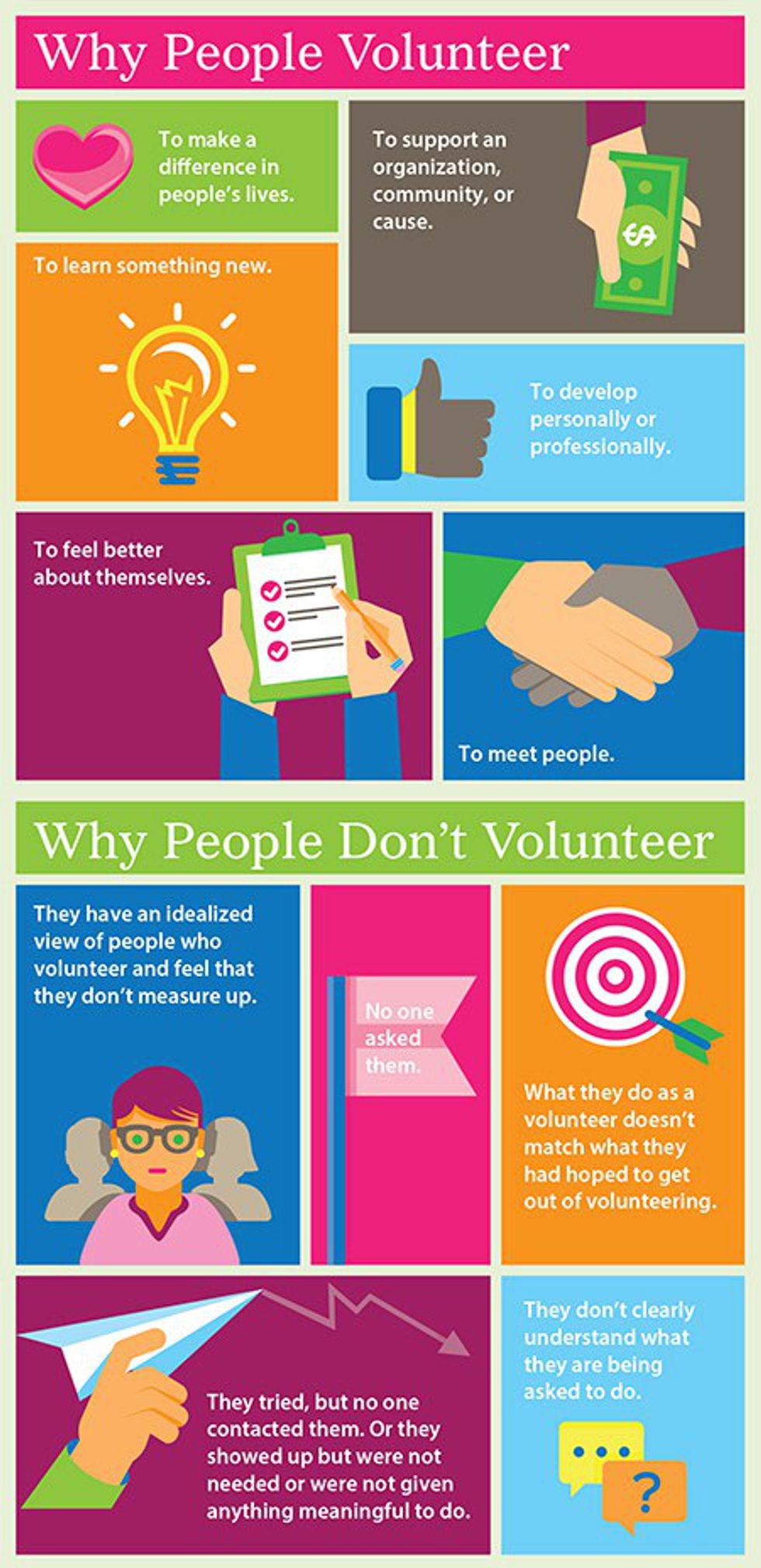For starters, let me clarify that no one actually hates the idea of volunteer work. Donating your time, energy and materials to someone in need can help you beef up a wimpy resume, travel inexpensively, meet new people, learn new skills, pay off student debt and so much more. Studies have even shown that participating in volunteer work leads to lower blood pressure and a longer lifespan. So if volunteer work is so theoretically rewarding, why did only 75 percent of Americans do it within the last two years? Well, just like in any office or professional setting, volunteer work is a job that can go horribly wrong due to poor management, rigid time commitment and no sense of accomplishment. In order to recruit dedicated volunteers, they need to be treated just like an employee: with respect and incentive. Here are the top five things that piss off volunteers to the point where they aren’t coming back.
Infographic courtesy of www.ptotoday.com.
No One Gets Back to You
It starts out innocently enough: you log on to the volunteer organization’s website and fill out an online application. Two weeks go by with no response. You call the organization. They tell you to register as a volunteer through VolunteerMatch.com then fill out the online form. VolunteerMatch.com won’t let you create a profile. You call back the organization and the woman on the line says she doesn’t know what else to do. You ask if you can speak with her superior. She says he isn’t in today. You ask if you can just show up at the office and wait to speak with someone. She says to just keep waiting for someone to get back to you about the next volunteer event and hangs up. Two months roll by but what do you care? God knows you aren't contacting that volunteer group again.
Rigid Time Commitment
According to Christopher L. Scott’s Biblical Leadership blog, 58 percent of volunteers walk away from their commitments because of time devoted to school, work or other activities. Much like an unpaid internship, volunteer work is free labor that should work around a volunteer's personal schedule. In order to create a realistic call to action, volunteer organizations need to work one-on-one with every volunteer to determine what routine and responsibilities work best for everyone.
Bad Management or Leaders
Tom McKee, president and owner of www.volunteerpower.com, confessed on his website that he once quit a volunteer organization because “a meeting that should have lasted about two hours lasted four or five hours and I would get home at midnight. Then I would complain to my wife for another hour after I got home – not great for building a healthy marriage.” McKee also noted that, “The person who led the committee was a wonderful person, passionate about our mission, and a hard worker; however, that manager just couldn't lead meetings.” The ability to run empowering and efficient get-togethers is always a good skill, but starting off smaller can also demonstrate professionalism that people respect. Simple gestures like remembering names, shaking hands, and making sure everyone feels welcome helps build a solid community around an important cause.
Bad Professionalism
With that being said, no one wants to be a part of a volunteer organization that can’t get it together, even if it is backed by heart-warming charm. There’s a difference between wanting to help a worthy cause and actually getting down to the planning, marketing, finances and other nitty-gritty details that make it possible. Non-profits and other volunteer communities that don’t have experienced leaders with networking connections, budget-balancing experience, team building skills and steely determination are going to flop. Not to mention the dreaded “role ambiguity” volunteers face when they show up to an event and end up licking envelopes or alphabetizing files.
Not Feeling Like You’re Making a Difference
You know that feeling when you give someone directions, hold a door open for a stranger or take the time to have a real conversation with the middle-aged woman who handed you your bag of fried chicken at Zaxbys? It’s a warm, happy little bubble in your chest that brings a fleeting smile to your face before resuming the daily grind. These are the moments volunteers live for, so when weeks or months of continuous efforts aren’t paying off, the volunteer organization is to blame. Maybe the plan is falling apart or the cause isn’t overtly exciting, but volunteers choose to help others partly because they know they are needed and want to feel good about it. So even though cheering up a senior or making crafts with a child is the ultimate goal, volunteers still need to be patted on the back and reminded that they're valuable to the cause.




















